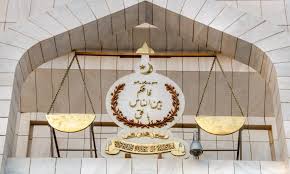A seven-member larger bench of the top court is not available during this week so the Supreme Court has decided to delist case relating to civilian trial in military court.
A private television reported that according to cause list, initially the case was scheduled for January 20 and 21d have been removed from the court’s calendar. The delay has raised concerns as the case involves significant constitutional questions regarding the jurisdiction and proceedings of military courts. The larger bench was expected to deliberate on whether the trials under military jurisdiction align with constitutional provisions for fair trial and due process.
In a separate development, the Supreme Court has scheduled the hearing of a petition filed by the founder of Pakistan Tehreek-e-Insaf (PTI) Imran Khan, seeking an investigation into alleged electoral rigging. Justice Amin-ud-Din will lead a six-member constitutional bench to hear Imran Khan’s petition on January 20.
The bench will also address Sher Afzal Marwat’s petition regarding electoral fraud allegations. The murder case of journalist Arshad Sharif has also been listed for hearing in the Supreme Court. The case, which garnered widespread national and international attention, will also be presided over by Justice Amin-ud-Din’s bench. The investigation into Arshad Sharif’s killing has been marred by controversy, with calls for an independent probe into the circumstances surrounding his death.
The Supreme Court will further deliberate on a suo motu notice concerning the allocation of development funds to members of the assembly. Additionally, the constitutional bench will examine a petition challenging the ban on student unions, a topic of significant importance for youth representation and activism in educational institutions.
“Earlier, on January 16, 2025, the Supreme Court (SC) ordered the Ministry of Defence to submit data regarding civilian trials in military courts, specifically asking for the number of civilians involved, excluding Indian spy Kulbhushan Jadhav.”
The bench, headed by Justice Aminuddin Khan, continued hearing intra-court appeals challenging the decisions of military courts. The bench also comprised Justices Jamal Khan Mandokhail, Muhammad Ali Mazhar, Syed Hasan Azhar Rizvi, Naeem Akhtar Afghan, Musarrat Hilali, and Shahid Bilal Hassan. During the hearing, Ministry of Defence lawyer Khawaja Haris stated that once Article 8, Section 3 applies, fundamental rights are nullified.
Justice Naeem Akhtar remarked that the Army Act addresses officers and personnel of the armed forces, and before the amendment, retired officers were tried in military courts. Now, civilians have also been included in military trials, raising concerns that the term “any person” in the law lacks a clear definition. Justice Akhtar suggested that this might be a flaw in the legislation. The SC also discussed how military trials should be conducted, with Justice Hassan Azhar Rizvi highlighting the importance of reviewing trial records to assess the merit of evidence.





